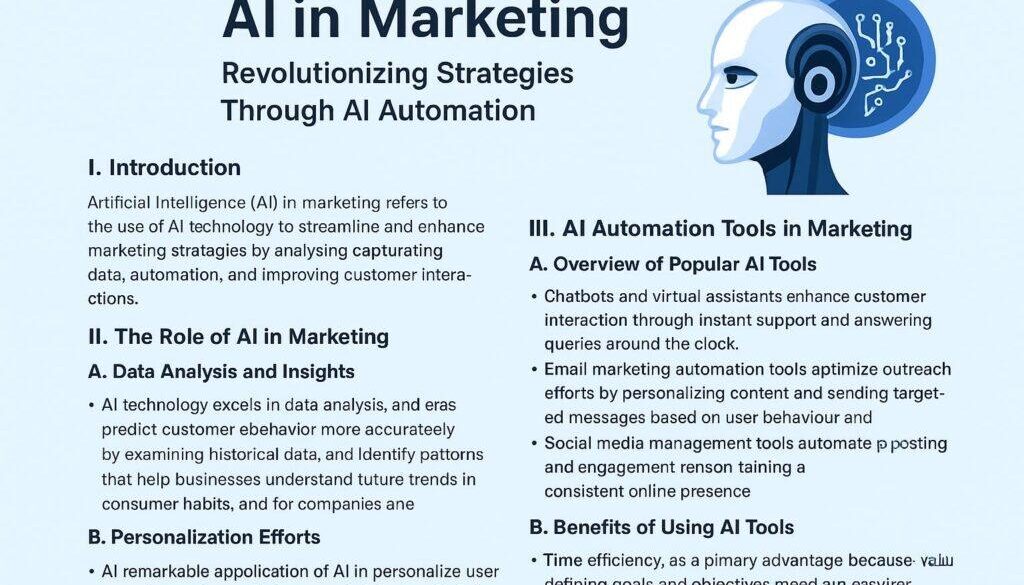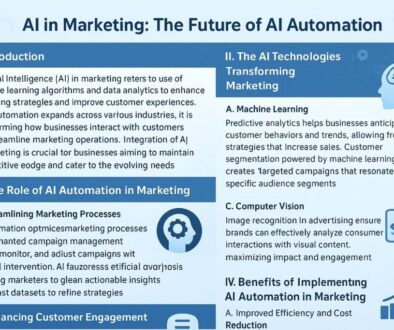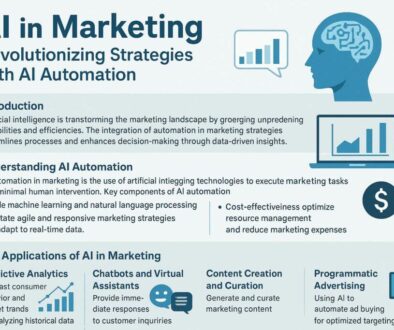Revolutionizing Marketing Strategies: How AI Automation Transforms the Industry
AI in Marketing: Revolutionizing Strategies Through AI Automation
I. Introduction
Artificial Intelligence (AI) in marketing refers to the use of AI technology to streamline and enhance marketing strategies by analyzing data, automating tasks, and improving customer interactions. AI automation allows marketers to leverage powerful algorithms that interpret vast amounts of data, enabling data-driven decision-making. In today’s fast-paced business environment, the importance of AI in marketing cannot be overstated, as it helps businesses remain competitive by optimizing their marketing efforts.
II. The Role of AI in Marketing
A. Data Analysis and Insights
AI technology excels in data analysis, allowing brands to predict customer behavior more accurately. By examining historical data, AI algorithms can identify patterns that help businesses understand future trends in consumer habits. Furthermore, these insights enable companies to anticipate market changes and competitors’ actions, leading to more effective marketing strategies.
B. Personalization Efforts
One of the remarkable applications of AI in marketing is its ability to personalize user experiences. AI-driven algorithms analyze user data to provide tailored content recommendations, ensuring that customers receive relevant information and products. Additionally, businesses can create targeted advertising campaigns that resonate with the individual preferences of their audience, leading to higher engagement rates and conversion.
III. AI Automation Tools in Marketing
A. Overview of Popular AI Tools
Several AI tools play a pivotal role in modern marketing strategies. Chatbots and virtual assistants enhance customer interaction by providing instant support and answering queries round the clock. Email marketing automation tools optimize outreach efforts by personalizing content and sending targeted messages based on user behavior, while social media management tools help automate posting and engagement, ensuring brands maintain a consistent online presence.
B. Benefits of Using AI Tools
Employing AI tools in marketing results in significant benefits for businesses. One of the primary advantages is time efficiency, as automation frees up valuable resources that can be redirected towards strategy and creativity. Furthermore, AI tools lead to cost reduction by minimizing human error and optimizing marketing expenditures, all while enhancing customer engagement through personalized interactions.
IV. Implementing AI Automation in Marketing Strategies
A. Identifying Goals and Objectives
The first step in implementing AI automation in marketing strategies is clearly defining goals and objectives. By understanding what the brand aims to achieve, businesses can align their AI tools and strategies to meet these goals effectively. This clarity ensures that AI serves as a driving force behind meaningful marketing campaigns.
B. Selecting the Right Tools
Choosing the appropriate AI tools is crucial for successful implementation. Organizations need to consider various factors, such as the specific marketing challenges they wish to address and the compatibility of the tools with existing systems. By selecting tools that best fit their needs, businesses can fully capitalize on the advantages of AI automation.
C. Integration with Existing Systems
Integrating AI tools into existing marketing frameworks is another essential step. Organizations must ensure that their new AI solutions can seamlessly interact with current systems, providing a holistic view of marketing efforts. This integration is critical for maximizing efficiency and retaining operational cohesiveness.
D. Measuring Success and ROI
To evaluate the effectiveness of AI automation in marketing, measuring success and ROI is necessary. Businesses should establish key performance indicators (KPIs) that reflect the contributions of AI to marketing objectives. Regular assessments help in optimizing strategies and demonstrating the value of AI investments.
V. Challenges and Considerations
A. Data Privacy and Security Concerns
As businesses leverage AI for marketing, data privacy and security emerge as critical concerns. Ensuring compliance with regulations such as GDPR and CCPA is paramount, as consumers are increasingly aware of how their data is used. Brands must adopt stringent data protection measures to build and maintain trust among their customers.
B. Importance of Human Oversight
Despite the capabilities of AI technology, human oversight remains a vital component of successful AI implementation. Marketers need to ensure that automated processes align with the brand’s voice and values. This balance helps mitigate risks and fosters meaningful customer relationships while utilizing the efficiency of AI.
C. Keeping up with Rapid Changes in AI Technology
The field of AI technology is constantly evolving, posing a challenge for marketers to stay informed about the latest trends and tools. Businesses must invest in ongoing education and training for their teams to maintain a competitive edge in a landscape defined by rapid technological advancement. Adapting to change is crucial for long-term success.
VI. Future Trends in AI and Marketing
A. Predictive Analytics and its Growing Role
As AI technology matures, predictive analytics will play a more significant role in marketing strategies. By leveraging advanced machine learning techniques, businesses can anticipate consumer behaviors and preferences, enabling proactive marketing efforts. This shift will enhance customer satisfaction and drive business growth.
B. Advancements in Natural Language Processing
Natural Language Processing (NLP) is set to revolutionize customer engagement through more intuitive interactions. As AI systems become proficient in understanding human language, brands can offer improved conversational interfaces, making it easier for customers to communicate their needs and preferences. This advancement will facilitate more engaging and personalized customer experiences.
C. The Rise of Voice and Visual Search
As smart speakers and visual search technologies gain popularity, marketers must adapt their strategies to optimize for these trends. AI will play a crucial role in improving search capabilities, allowing businesses to reach customers through more varied channels. Embracing voice and visual search will help brands stay relevant in a changing marketing landscape.
VII. Case Studies
A. Successful Implementations of AI in Marketing
Many leading brands have successfully integrated AI into their marketing strategies. For instance, Amazon is well-known for its personalized recommendation system, which uses AI algorithms to provide tailored shopping experiences. Similarly, Netflix employs AI to analyze viewer preferences and suggest relevant content, significantly enhancing user engagement.
B. Lessons Learned from Leading Brands
From these successful implementations, businesses can glean valuable lessons. Understanding the importance of data-driven decision-making and the need for continuous adaptation to technological advancements are crucial takeaways. An iterative approach, where companies refine their AI strategies based on performance data, can lead to sustained success in marketing.
VIII. Conclusion
In summary, the benefits of AI automation in marketing are profound and far-reaching. By leveraging predictive analytics, customer personalization, and effective engagement tools, businesses can enhance their marketing strategies. Companies are encouraged to adopt AI technologies not just to compete, but to thrive in an increasingly dynamic market.
IX. Additional Resources
A. Recommended Reading
- "Artificial Intelligence in Marketing: A Comprehensive Guide"
- "Data-Driven Marketing: The 15 Metrics Everyone in Marketing Should Know"
B. Links to AI Tools and Software
C. Industry Reports and Research Studies
- "The Future of AI in Marketing: Trends and Insights"
- "Consumer Behavior Trends: How AI Is Shaping the Market"



